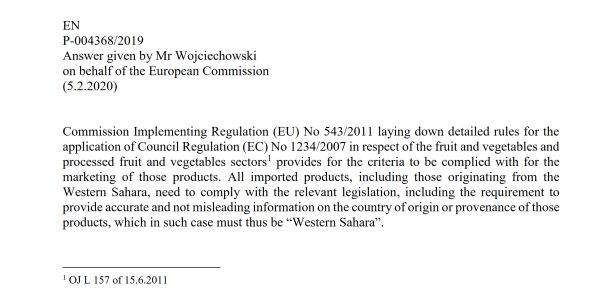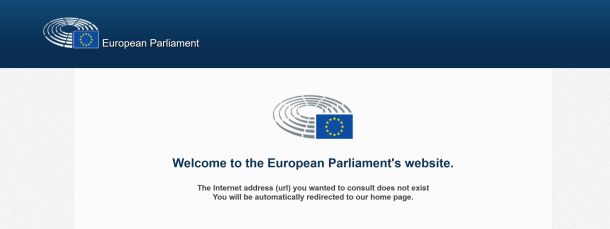La décision d'annuler l'accord commercial entre l'UE et le Maroc a été saluée par l'UA le week-end dernier. "Une étape importante dans les efforts mondiaux visant à assurer que les ressources naturelles du Sahara Occidental, en tant que territoire non autonome, sont protégées pour le bénéfice de son propre peuple", a déclaré l'UA.
Le 12 décembre, l'Union Africaine a publié une déclaration prenant note de l'annulation de la Cour de Justice européenne de l'accord commercial UE-Maroc, parce qu'il n'exclut pas spécifiquement le territoire du Sahara Occidental.
En raison de son occupation illégale du Sahara Occidental, le Maroc est le seul pays en Afrique à ne pas être membre de l'UA.
Trouvez ci-dessous le texte intégral du communiqué de l'UA (en anglais)
The African Union notes the importance of the judgment of the European Union Court of Justice on the exploitation of the natural resources of Western Sahara and calls for renewed international efforts to address this issue
Addis Ababa, 12 December 2015: The Chairperson of the Commission of the African Union (AU), Dr. Nkosazana Dlamini Zuma, notes the importance of the judgment of the European Union (EU) Court of Justice of 10 December 2015, which annulled the trade deal in agricultural and fisheries products, concluded, in March 2012, between the Kingdom of Morocco and the EU, due to its inclusion of Western Sahara. It should be recalled that Western Sahara has been inscribed since 1963 on the list of territories to which the UN General Assembly resolution 1514 (XV) of 14 December 1960 on the Granting of Independence to Colonial Countries and People applies.
This decision marks an important step in the global efforts aimed at ensuring that the natural resources of Western Sahara, as non-self-governing territory, are protected for the benefit of its own people. In this respect, the AU has repeatedly called on all concerned to halt the exploration and the exploitation of Western Sahara’s resources and desist from entering into any agreements that would violate the Sahrawi people’s permanent sovereignty over their natural resources. In his 10 April 2014 report concerning the situation in Western Sahara, and in the light of increased interest in these resources, the UN Secretary-General stressed that it was timely to call upon all relevant actors to “recognize the principle that the interests of the inhabitants of these territories are paramount”, in accordance with Chapter XI, Article 73 of the Charter.
The Chairperson of the Commission reiterates the AU’s call for the early resolution of the now four-decade long conflict in Western Sahara, in line with international legality. She appeals to the UN Security Council to fully assume its responsibility in this respect, bearing in mind its repeated calls to the two parties to the conflict, namely the Kingdom of Morocco and the Frente POLISARIO, to enter into direct negotiations, without preconditions and in good faith, with the aim of achieving a just, lasting and mutually acceptable political solution, which will provide for the self-determination of the people of Western Sahara, in the context of arrangements consistent with the UN principles and purposes.
La Commission de l'UE recule sur l'étiquetage des produits du Sahara
Quelle est la position de l'UE sur l'étiquetage des produits du Sahara Occidental occupé ? La Commission européenne a publié pour la troisième fois une réponse à une question parlementaire sur le sujet, mais la dernière version ne répond pas à la question.
Pourquoi cette déclaration de l'UE continue à disparaître ?
Une clarification de la Commission Européenne sur l'étiquetage des produits du Sahara Occidental a été publiée, puis supprimée, puis publiée à nouveau et a été supprimée à nouveau des sites Internet de l'UE.
Confirmation: les produits du Sahara Occidental à étiqueter comme tels
Il y a deux semaines, la Commission européenne a annoncé que les produits du Sahara Occidental doivent être étiquetés comme tels, pour retirer cette déclaration dès le lendemain. Aujourd'hui, la Commission réaffirme sa position initiale.
Retournement spectaculaire de la CE sur l'étiquetage du Sahara
Le 5 février 2020, la Commission européenne a annoncé que les produits du Sahara Occidental devraient être étiquetés en conséquence. Mais environ 24 heures plus tard, toutes les traces de cette déclaration ont été supprimées des sites Web de l'UE.



